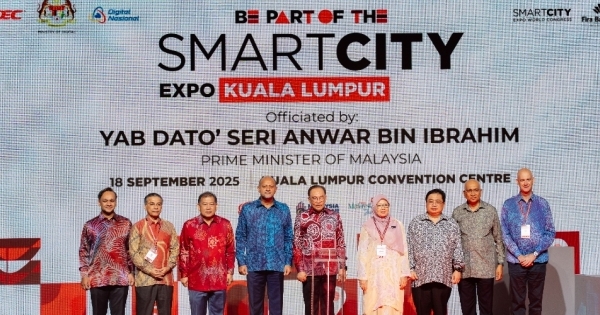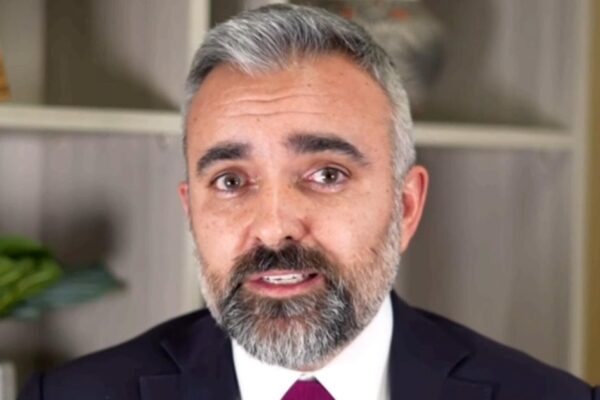
Malaysia sets 30% contribution from digital economy to its GDP by 2030
**Positions Itself as AI Nation at Inaugural Smart City Expo KL; Budget 2026 to Strengthen Institutions like GovTech and Data Commission**
Technology is evolving at an unprecedented pace, impacting everyone, everywhere, declared Gobind Singh Deo, Malaysia’s Digital Minister, at the opening of Smart City Expo Kuala Lumpur 2025 (SCEKL25). Speaking without notes and far exceeding his allotted five minutes, the minister clearly had much to share.
“It’s not a question of choice. It is something we need to do,” he stressed. That sense of urgency set the tone for the three-day SCEKL25 event and the twin Malaysia Digital Xceleration Summit (MDX25), both held in Kuala Lumpur. Today marks the conclusion of these events, which featured a full schedule of activities.
### Smart City Expo KL and Malaysia Digital Xceleration Summit
SCEKL is an offshoot of the globally recognized Smart City Expo World Congress, held annually since 2011. The Kuala Lumpur event is the first time the expo has been held in Southeast Asia. Meanwhile, MDX is the Malaysian Digital Economy Corporation’s (MDEC) annual tech conference, launched in 2023.
Together, these events underscore Malaysia’s ambition not only to embrace the next wave of digital transformation but also to play a leading role in shaping how Southeast Asia navigates it.
### From Connectivity to AI Ecosystems
Reflecting on Malaysia’s rapid digital transformation, Gobind recalled his first term as minister in 2018. “Back then, the tech conversations were all about connectivity,” he said, highlighting the government’s efforts to expand affordable nationwide access to 4G and 5G networks. “We had to make sure there was equality, so no one was left behind.”
Fast forward to 2025, and the agenda looks very different. “The question is no longer whether Malaysians can get online, but how the nation can prepare an entire ecosystem to responsibly harness AI,” he explained. This involves forward-thinking on infrastructure as well as ethics, cybersecurity, and data governance.
“We cannot be in a position where we wait for something to happen, and when it happens, we are not prepared,” Gobind warned. “At that point, the damage may be irreparable.”
To illustrate the stakes, he offered a scenario: “If a robot was conducting an operation on any one of us, with a doctor operating remotely from Canada, we must make sure the network doesn’t collapse midway through. We must ensure the network is secure.”
Trust, he emphasized, will be the foundation of future technologies.
### Legislative and Policy Frameworks in Progress
Gobind pointed to key legislative and policy initiatives already underway, including the Cybersecurity Act tabled in Parliament last year, efforts to strengthen the Personal Data Protection Act, and the introduction of the AI Nation 2030 roadmap in the 13th Malaysia Plan (RMK13). This roadmap identifies sectors such as healthcare, transport, and public services as priority areas for high-impact AI adoption.
However, the minister urged that Malaysia must go further by anticipating challenges five to ten years ahead and establishing governing structures now. “Some level of thinking must go into creating an ecosystem where we know for certain that the robots around us are going to act in our best interest,” he stated.
This responsibility extends beyond physical robotics to include language models and digital assistants, where data integrity is critical. “If the data going into these models is inaccurate, the consequences could be catastrophic—from flawed medical procedures to poor investment decisions.”
### Preparing Businesses and Government for AI Adoption
During a press conference, Gobind addressed questions about the readiness of businesses and government agencies to embrace AI. He highlighted progress made in data centers, digitization, and cybersecurity, noting that industries are already employing AI solutions. Adoption is expected to accelerate further under the AI Nation 2030 roadmap.
Looking ahead to Budget 2026, the minister emphasized the need to strengthen institutions such as GovTech and the Data Commission, alongside increased investment in cybersecurity, personal data protection, and talent development. “These measures are key to achieving our target of a 30% digital GDP contribution by 2030,” he said.
### MDEC’s Role in Realizing the Vision
Malaysia Digital Economy Corporation (MDEC) is tasked with turning the government’s vision into reality. Anuar Fariz Fadzil, MDEC’s CEO, described MDX25 as a collaborative platform where Malaysia’s digital future is shaped through ideas, partnerships, and opportunities.
With Malaysia’s commitment to becoming an AI nation by 2030, Anuar pointed to MDEC’s five focus pillars: next-gen data, trust, computing, talent, and creativity. “These areas translate directly into jobs, opportunities, and growth for the people,” he noted.
He reminded attendees that MDX is not just a local showcase but a global one, attracting over 5,000 participants, 40 next-gen exhibitors, and fostering cross-border collaborations. For Malaysia’s one million SMEs, this event provides critical visibility—a chance to connect with investors and showcase solutions on the world stage.
### Regional and Global Implications
Situating Malaysia’s efforts in a regional context, Gobind acknowledged that ASEAN counterparts face similar challenges and opportunities. “This is a global conversation,” he said. “If we create ecosystems that strengthen both us and our partners in ASEAN and beyond, together we build resilience for this new era of digital transformation.”
On the economic front, Gobind reaffirmed the government’s goal of increasing the digital economy’s contribution to Malaysia’s GDP from 25% this year to 30% by 2030. To achieve this, both industry players and citizens must be empowered to adopt digital tools at scale.
### Embracing Responsibility and Fostering Dialogue
“New technologies inspire us, but we must take responsibility for how they shape our society,” the minister said. “We must always remain in a position to govern what happens.”
He emphasized the importance of continued dialogue and collaboration, urging for frank conversations that do not shy away from uncomfortable truths. “The discussion must start now, and it must be frank. We must be able to state our fears, anticipate where technology is moving, and ask ourselves what the government must do to prepare.”
To that end, the Ministry of Digital will continue hosting events like SCEKL and MDX to ensure Malaysia stays ahead of the curve in digital transformation.
https://www.digitalnewsasia.com/digital-economy/malaysia-sets-30-contribution-digital-economy-its-gdp-2030
You may also like
参考资料
You may be interested
Clovis Police now using drones as ‘first responders’
**Clovis Police Department Introduces Drone First Responders to Enhance Public...
Congress Leader Rahul Gandhi Says He’s ‘Getting Help From Inside ECI’ To Expose Alleged Vote Fraud – Video
New Delhi: Congress leader Rahul Gandhi has alleged that he...
Challans there but no public toilets? Court pulls up NHAI
**Challans There but No Public Toilets? Kerala High Court Pulls...
 The New York Times
The New York Times
- Bomb Threats Referring to Haitian Immigrants Disrupt Springfield, Ohio 2026 年 2 月 9 日 Miriam Jordan and Kevin Williams
- San Francisco Teachers Begin Strike, Closing School for 50,000 Students 2026 年 2 月 9 日 Soumya Karlamangla, Laurel Rosenhall and Shawn Hubler
- Gateway Funding Doesn’t Have to Be Immediately Restored, Judge Says 2026 年 2 月 9 日 Patrick McGeehan
- Allies Back Keir Starmer Amid Pressure to Resign Over Epstein Turmoil 2026 年 2 月 9 日 Michael D. Shear and Stephen Castle
- 2 to 3 Cups of Coffee a Day May Reduce Dementia Risk. But Not if It’s Decaf. 2026 年 2 月 9 日 Pam Belluck
- Israel Gives Itself More Control Over Occupied West Bank 2026 年 2 月 9 日 David M. Halbfinger and Isabel Kershner
- It’s Time for America to Admit That It Has a Marijuana Problem 2026 年 2 月 9 日 The Editorial Board
- Will This High School Coach Get to 973 Wins Before He Gets Fired? 2026 年 2 月 9 日 David Waldstein and Reece Taylor Williams
- What to Know About the Disappearance of Savannah Guthrie’s Mom, Nancy 2026 年 2 月 9 日 Claire Moses
- Bar Complaint Filed Over Search of Washington Post Reporter’s Home 2026 年 2 月 9 日 Charlie Savage



Leave a Reply